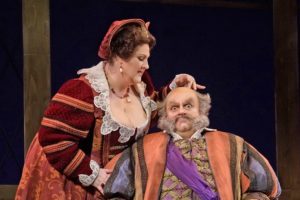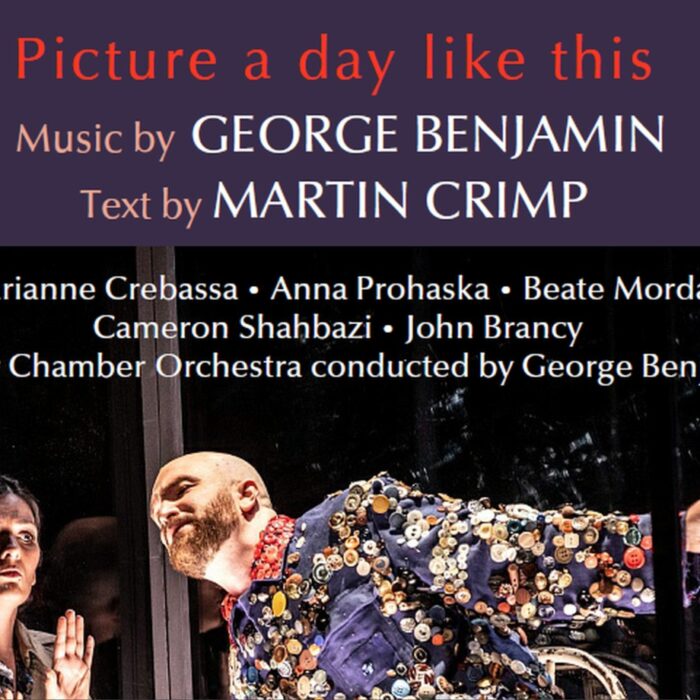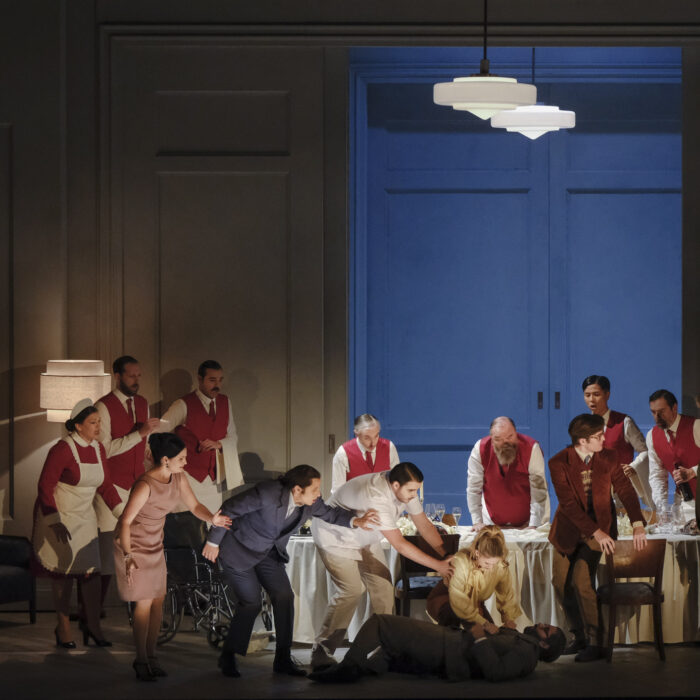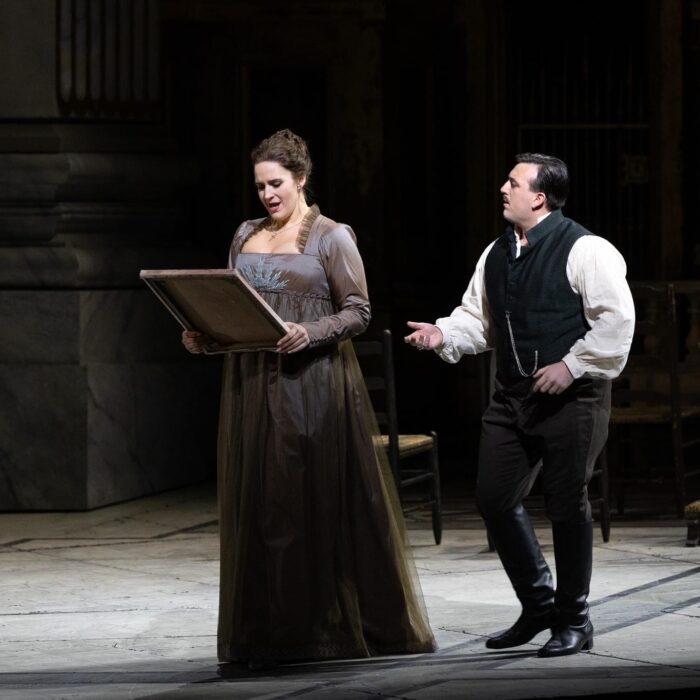
Berkshire Opera Festival 2021 Review: Falstaff
Sebastian Catana Leads Perfect Ensemble in Verdi’s final masterpiece.
By Matt CostelloWhat a wonder Giuseppe Verdi’s final opera “Falstaff” is. After all, he had, outside of his “Quattro pezzi sacri,” retired from the “arena” of composing and opera (with one of the grandest of all grand operas, “Aida”).
But then, fate conspired, in a rather unlikely way, to have the maestro cross paths, and then lives, and ultimately work itself, with the formidably talented Arrigo Boito. Not that the collaboration seemed foreordained, not in the slightest. It would take Boito quite a bit of persuading, along with some significant “mea culpas” before the pair performed their first collaborative effort, the revision of Verdi’s late work, “Simon Boccanegra.” That was followed by the pair with a thunderbolt of a masterpiece: “Otello,” where the world welcomed this late-in-the-day wonder from the maestro who all thought was well done with composing.
Surely that had to, be it? But once again, Boito, seeing how the collaboration led to what was clearly amazing work, began to tease and exhort the aged (nearing 80) composer to once again begin writing music.
And so, Verdi composed his second comedy, this rather remarkable “Falstaff.”
For Connoisseurs?
When I was first beginning to explore the world of opera, I read some commentary where the writer suggested that “Falstaff” is an opera for “connoisseurs.” But I think anyone attending the recent Berkshire Opera production, playing at the Mahaiwe Theatre in Great Barrington, Massachusetts, would be inclined to disagree.
Musically, and for sheer entertainment, this final opera is nothing less than a near-miraculous jewel. But for such a jewel to shine, it needs – to be sure—a gifted and powerful singing actor in the lead role. And this production was truly fortunate to have in that role the bass-baritone, Sebastian Catana.
Catana’s rich voice made all of Falstaff’s clever music fill the classic 1905 theatre. The text and lyrical music were delivered with both precision and a comic sensibility that had me smiling for two reasons. Yes, the music beautiful, subtle – so fresh from the aged composer. But with Boito’s sly and clever text, Falstaff’s scenes played out with so much natural humor and warmth.
And Catana’s Falstaff is no cardboard version of the character. In all his buffo girth, this Sir John was a rich, three-dimensional character, with his delusions, avariciousness and amorous aspirations on full display.
We — of course – welcome his come-uppance at the scene at the Windsor Oak as the “spirits” seem to appear to extract his repentance. But with this warm portrayal of Catana’s, we quite simply love this Falstaff. And the text even suggests that those out to turn the tables on him — The Merry Wives backed by their husbands and townspeople — might actually miss not having the cavalier with his great paunch and appetites in their lives.
The performance was, in a word, for me, perfect. Has Sir John’s dismissal of “honour (“L’Onore Ladri”),” ever been delivered with better comic and musical precision?
Matching Catana
And here’s the rather wonderful thing…Catana’s Falstaff was matched with a cast that shined brilliantly as well. The wacky team of Pistola (Jeremy Harr) and Bardolfo (Max Jacob Zabder) were perfect Shakespearean fools. Their shifting loyalties were as much fun to observe as their physical antics.
The women who are Falstaff’s target sang with a beauty and clear, ringing tones as they plotted. Soprano Joanne Evans’ Meg Page was bright and sparkling throughout, matched with the forceful presence and the matching mezzo of Tamara Wilson’s Alice Ford. The pair was wonderful to hear, while having so much fun with their ‘target’, Sir John himself.
They were aided by their powerful (and befittingly deep) contralto Alissa Anderson’s Mrs. Quickly. The trio performed their scenes as if they had been singing these parts together for years; timing and tone flawless.
The Nanetta of Jasmine Habersham carried off the sweet yearning of a young woman frustrated by her father’s plans to marry her off to the much older Dr Caius. Nanetta’s aria, ‘Sol fil d’un soffio etesio’ was as sweet and youthful as it should be, an appropriate contrast with the ensemble of the Merry Wives and their plans.
Her Fenton, Jonas Hacker, matched her well…exactly what a young swain should sound and look like. His tenor carried off Act three’s “Dal labbro il canto estasiato vola” with a smooth and stirring grace, as both he and Habershan gave a spotlight to the subplot of the duo’s true love conquering all, with simply terrific singing.
Thomas Glass made for an excellent Ford, with his ringing “E sogno? O realta” a major musical highlight, among a production filled with them. And Lucas Levy’s Dr Caius, fated to be tricked and ‘married’ to masked Bardolfo, was consistently fun to watch.
The orchestra, led by Brian Garman, captured the bubbly pace of Verdi’s final work. With crisp playing, the orchestra made sure that the music matched the often-frenetic action on stage. The opening of Act three, a mini-prelude, was as racing and satisfying as any I’ve heard. The musician and their leader received a boisterous ovation at the end, all well deserved.
Staging by Joshua Major was just enough to capture the Garter Inn, the gardens where the wives plot and plan, and then finale’s moonlit forest of Windsor, dominated by the oak. Scenes were mounted and changed quickly as if the action could not be left waiting, old-fashioned placards coyly placed on the side of the stage, letting us know the next scene.
Costume and lighting worked wonderfully (such as Falstaff’s transformation into a plumed lothario out to seduce someone else’s wife). The chorus delivered a bubbly, and joyous performance, clearly enjoying the show as much as the audience.
But how good it was to be together, on a summer’s afternoon, at this giddy and wonderful celebration of the foolishness on stage — and lest we forget, when the fugue arrives at the end – “Tutto nel mondo é burla” genially reminding us that there’s probably a good amount of foolishness among all of us watching, clapping and cheering.


